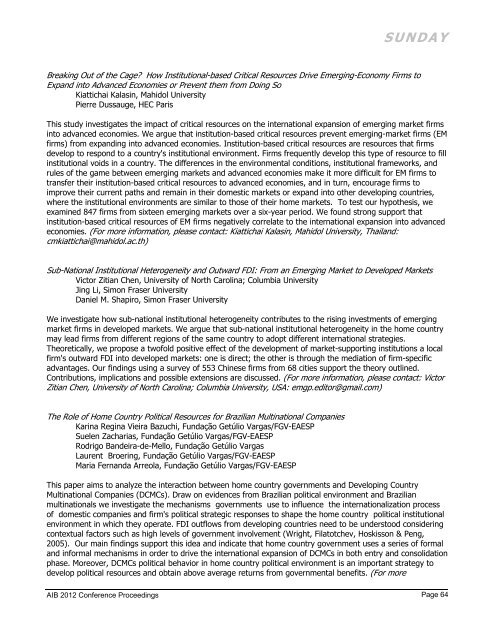AIB 2012 Conference Proceedings - Academy of International ...
AIB 2012 Conference Proceedings - Academy of International ...
AIB 2012 Conference Proceedings - Academy of International ...
Create successful ePaper yourself
Turn your PDF publications into a flip-book with our unique Google optimized e-Paper software.
SUNDAY<br />
Breaking Out <strong>of</strong> the Cage How Institutional-based Critical Resources Drive Emerging-Economy Firms to<br />
Expand into Advanced Economies or Prevent them from Doing So<br />
Kiattichai Kalasin, Mahidol University<br />
Pierre Dussauge, HEC Paris<br />
This study investigates the impact <strong>of</strong> critical resources on the international expansion <strong>of</strong> emerging market firms<br />
into advanced economies. We argue that institution-based critical resources prevent emerging-market firms (EM<br />
firms) from expanding into advanced economies. Institution-based critical resources are resources that firms<br />
develop to respond to a country's institutional environment. Firms frequently develop this type <strong>of</strong> resource to fill<br />
institutional voids in a country. The differences in the environmental conditions, institutional frameworks, and<br />
rules <strong>of</strong> the game between emerging markets and advanced economies make it more difficult for EM firms to<br />
transfer their institution-based critical resources to advanced economies, and in turn, encourage firms to<br />
improve their current paths and remain in their domestic markets or expand into other developing countries,<br />
where the institutional environments are similar to those <strong>of</strong> their home markets. To test our hypothesis, we<br />
examined 847 firms from sixteen emerging markets over a six-year period. We found strong support that<br />
institution-based critical resources <strong>of</strong> EM firms negatively correlate to the international expansion into advanced<br />
economies. (For more information, please contact: Kiattichai Kalasin, Mahidol University, Thailand:<br />
cmkiattichai@mahidol.ac.th)<br />
Sub-National Institutional Heterogeneity and Outward FDI: From an Emerging Market to Developed Markets<br />
Victor Zitian Chen, University <strong>of</strong> North Carolina; Columbia University<br />
Jing Li, Simon Fraser University<br />
Daniel M. Shapiro, Simon Fraser University<br />
We investigate how sub-national institutional heterogeneity contributes to the rising investments <strong>of</strong> emerging<br />
market firms in developed markets. We argue that sub-national institutional heterogeneity in the home country<br />
may lead firms from different regions <strong>of</strong> the same country to adopt different international strategies.<br />
Theoretically, we propose a tw<strong>of</strong>old positive effect <strong>of</strong> the development <strong>of</strong> market-supporting institutions a local<br />
firm's outward FDI into developed markets: one is direct; the other is through the mediation <strong>of</strong> firm-specific<br />
advantages. Our findings using a survey <strong>of</strong> 553 Chinese firms from 68 cities support the theory outlined.<br />
Contributions, implications and possible extensions are discussed. (For more information, please contact: Victor<br />
Zitian Chen, University <strong>of</strong> North Carolina; Columbia University, USA: emgp.editor@gmail.com)<br />
The Role <strong>of</strong> Home Country Political Resources for Brazilian Multinational Companies<br />
Karina Regina Vieira Bazuchi, Fundação Getúlio Vargas/FGV-EAESP<br />
Suelen Zacharias, Fundação Getúlio Vargas/FGV-EAESP<br />
Rodrigo Bandeira-de-Mello, Fundação Getúlio Vargas<br />
Laurent Broering, Fundação Getúlio Vargas/FGV-EAESP<br />
Maria Fernanda Arreola, Fundação Getúlio Vargas/FGV-EAESP<br />
This paper aims to analyze the interaction between home country governments and Developing Country<br />
Multinational Companies (DCMCs). Draw on evidences from Brazilian political environment and Brazilian<br />
multinationals we investigate the mechanisms governments use to influence the internationalization process<br />
<strong>of</strong> domestic companies and firm's political strategic responses to shape the home country political institutional<br />
environment in which they operate. FDI outflows from developing countries need to be understood considering<br />
contextual factors such as high levels <strong>of</strong> government involvement (Wright, Filatotchev, Hoskisson & Peng,<br />
2005). Our main findings support this idea and indicate that home country government uses a series <strong>of</strong> formal<br />
and informal mechanisms in order to drive the international expansion <strong>of</strong> DCMCs in both entry and consolidation<br />
phase. Moreover, DCMCs political behavior in home country political environment is an important strategy to<br />
develop political resources and obtain above average returns from governmental benefits. (For more<br />
<strong>AIB</strong> <strong>2012</strong> <strong>Conference</strong> <strong>Proceedings</strong><br />
Page 64

















